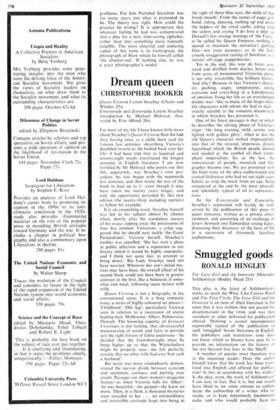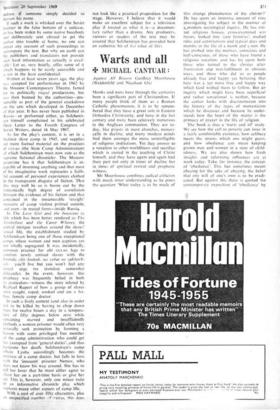Smuggled good s
RONALD HINGLEY
The Love Girl and the Innocent Alexander Solzhenitsyn (Bodley Head 21s)
This play is the latest of Solzhenitsyn's works to reach the West. Like Cancer Ward and The First Circle. The Love Girl and the Innocent is an item of illicit literature in the sense that it was written (but not passed for dissemination) in the USSR, and was then somehow or other delivered for publication abroad. Showing a casual incompetence regrettably typical of the publication of such 'smuggled' Soviet literature in English. the publishers and translators (one does not know which to blame) have seen fit to provide no information on the history of the text beyond five lines in the 'blurb'.
A number of queries must therefore nag at the inquiring reader. Does the author himself know that his work has been trans- lated into English and offered for publica- tion? Is this in accordance with his wishes? Is the play, even, the work of Solzhenitsyn? I am sure, in fact, that it is, but one would have liked to see some attempt to authen- ticate the authorship of a writer who re- mains, or is kept, notoriously incommuni- cado, and who would probably have no redress if someone simply decided to borrow his name.
If such a work is whisked over the Soviet frontier in the false bottom of a suitcase, or has been stolen by some native busybody and deliberately sent abroad to get the author into trouble at home, no one can expect any account of such proceedings to accompany the text. But why on earth can the publishers and translators not provide such hard information as actually is avail- able! Let us, very briefly, offer some of it which happens to be easily accessible and is not in the least confidential.
Written at least seven years ago, the play was accepted for performance in 1962 by the Moscow Contemporary Theatre, famed for its politically risque productions, but was then banned by the authorities—pre- sumably as part of the general crackdown on the arts which developed in December of that year. It has never been published in Russia—or performed either, as Solzhenit- syn himself complained in his celebrated Open Letter to the Fourth Congress of Soviet Writers, dated 16 May 1967.
As for the play's content, it is set in a Stalinist slave camp in 1945, and supplies yet more factual material on the practices of GULAG (the State Camp Administration) of which Solzhenitsyn must now rate as the supreme fictional chronicler. The Moscow grapevine has it that Solzhenitsyn is in- capable of inventing anything and that most of his imaginative work represents a faith- ful account of personal experiences clothed in the transparent disguise of fiction. That this may well be so is borne out by the fantastically high degree of correlation between the evidence of his fiction and that contained in the innumerable 'straight' memoirs of camp victims printed outside, and even—in muted form—inside Russia.
In The Love Girl and the Innocent (a title which has been better rendered as The Tenderfoot and the Camp Whore), the central intrigue revolves around the slaves' sexual life, the establishment studied by Solzhenitsyn being one of those exceptional camps where women and men captives are not wholly segregated. It was, incidentally, common practice for old GULAG lags to comfort newly arrived slaves with the formula zhit budesh, no yebat ne zakhoch- esh-- you'll live but you won't feel any sexual urge (to translate somewhat delicately). In the event, however, this prophecy was frequently belied in both its particulars—witness the story related by Raphael Rupert of how a group of slaves once caught, raped, cooked and ate a fat, free, female camp doctor.
In such a lively context (and also in order not to be killed by having to chop down trees for twelve hours a day in a tempera- ture of fifty degrees below zero while remaining starved and insufficiently clothed), a woman prisoner would often very naturally seek protection by forming a liaison with some privileged free member of the camp administration who could get her exempted from 'general duties, and thus postpone her death. Solzhenitsyn's camp whore Lyuba accordingly becomes the mistress of a camp doctor, but falls in love with the 'innocent' prisoner Nemov, who does not know his way around. She has to tell her lover that he must either agree to share her on a part-time basis or give her up. This is, however, only one minor twist in an informative chronicle play which explores many other aspects of camp life.
With a cast of over fifty characters, plus an unspecified number ,sf extras. this does
not look like a practical proposition for the stage. However, I believe that it would make an excellent subject for a television play if treated as what it is—a documen- tary rather than a drama. Any producers, viewers or readers of the text may be assured that Solzhenitsyn has provided here an authentic bit of byt (slice of life).









































 Previous page
Previous page